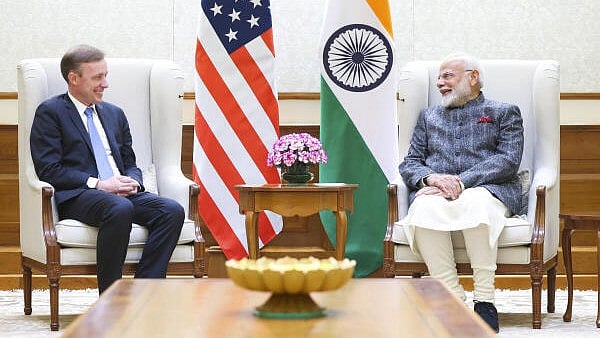
Prime Minister Narendra Modi during a meeting with US NSA Jake Sullivan, in New Delhi, on Monday.
Credit: PTI Photo
New Delhi: The USA is in the process of removing restrictions that prevent civil nuclear cooperation between Indian entities and US companies, Jake Sullivan, the outgoing US National Security Advisor said here on Monday, asserting that the “formal paperwork will be done soon.”
"The United States is now finalizing the necessary steps to remove long-standing regulations that have prevented civil nuclear cooperation between India's leading nuclear entities and US companies," Sullivan said at a public lecture at the Indian Institute of Delhi.
While the officials didn’t immediately clarify on the nature of the restrictions that will be removed, it is known that the civil nuclear cooperation didn’t really take off even after the signing of the India-US Civil Nuclear Cooperation agreement in 2008.
"Although former President Bush and former Prime Minister Singh laid out a vision of civil nuclear cooperation nearly 20 years ago, we have yet to fully realise it. The Biden administration has determined that it is time to take the next major step in cementing this partnership,” said Sullivan.
"The formal paperwork will be done soon, but this will be an opportunity to turn the page on some of the frictions of the past and create opportunities for entities that have been on restricted lists in the US to come off those lists and enter into deep cooperation with the US," he said.
Sullivan described the move by the US as a "statement of confidence" in the progress the two countries have made and the progress the two nations will continue to make as strategic partners and as "countries who share a commitment to peaceful nuclear cooperation".
Following the Indo-US agreement, the Department of Atomic Energy offered two sides – Chhaya Mithi Virdi in Gujarat and Kovvada in Andhra Pradesh – to the US nuclear firms to establish large scale nuclear power plants in collaboration with the Nuclear Power Corporation of India Ltd. The plans, however, have not been realised in the last 16 years.
Absence of such large power plants and India’s nuclear liability regimes are key reasons behind New Delhi pushing further its target of achieving 20,000 MW of electricity from nuclear energy by 2020. The current plan is to reach the target by 2030.
In the address, Sullivan also slammed China for its "predatory industrial strategies" in certain critical sectors including in chip manufacturing, clean energy and other emerging technologies, compelling the US companies to shift out of China and expand into India.
"Take, for example, Apple's significant investment in Indian production. Within the next couple of years, over one-fourth of all iPhones in the world will be made in India," he said.
The top official said there would be a need for New Delhi and Washington to work together to ensure valuable technologies in the fields of artificial intelligence and biotechnology don’t fall into the wrong hands.
Sullivan will be replaced by Congressman Michael Waltz, who has been selected as the NSA by the new US President Donald Trump, who will take over on January 20.
